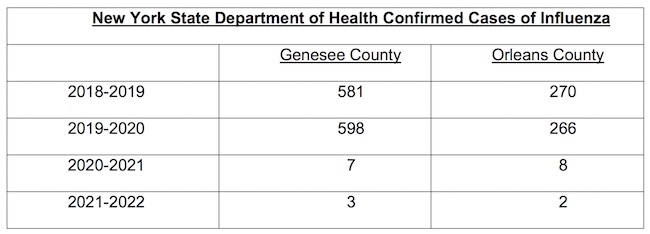Health Department urges flu vaccine with cold weather pushing people indoors
Press Release, Genesee and Orleans County Health Departments
The smell of the evergreen trees, the taste of warm hot cocoa, and the cheerful Christmas songs are some lovely things that bring family and friends together during this festive season. With cold weather moving people indoors, there is also an increased risk of the spread of illnesses such as the flu, also known as influenza. However, there are ways to lower your risk of getting sick with the flu.
National Influenza Vaccination Week (NIVW) is December 5-11. NIVW is an annual observance in December to remind everyone that there is still time to get vaccinated against the flu to be protected during the upcoming winter and holiday months.
“You can protect you and your family members by getting vaccinated against the flu each year,” said Paul Pettit, Director for Genesee and Orleans County Health Departments. “The vaccine lowers the chance of getting you and those around you sick with the flu. We also encourage those that have not received the Covid-19 vaccine, to get vaccinated as soon as possible ahead of the holidays.”
The flu is a contagious respiratory illness caused by influenza viruses that infect the nose, throat and sometimes the lungs. Experts say that flu viruses are spread mainly by tiny droplets made when people with the flu cough, sneeze or talk. These droplets can land in the mouths or noses of people who are nearby.
The runny nose, sore throat and slow development of symptoms which are common for a cold, are not as common for the flu which tends to appear suddenly and includes a fever, body aches, chills, fatigue, chest discomfort and cough. Although a cold can be a bother, you usually feel much worse with the flu and sometimes influenza’s complications could be deadly.
Everyone 6 months or older should get a flu vaccine every year. It’s best to get the flu vaccine early in flu season, ideally by the end of October. That way, the body develops antibodies in two weeks’ time which provides protection from the influenza virus. You might wonder, is it too late to get vaccinated? The simple answer is no.
“Getting the vaccine later is better than not getting it at all,” Pettit said. “Once you have the flu vaccine, research shows that the vaccination reduces the risk of severe illness if you do get the flu.”
Below are the number of reported flu cases for Genesee and Orleans Counties since 2018 according to the New York State Department of Health. You will notice that there was limited flu in 2020-2021 because people were practicing public health precautions such as frequent hand washing, social distancing, limiting social gatherings, wearing face coverings and staying home when ill.
In addition, less germs were spread because people were staying home and limiting their contact with people outside of their household as a result of the Covid-19 pandemic.
Flu seasons are unpredictable every year, so there is a new flu vaccine developed to potentially provide protection for the viruses that are considered to have the most potential to cause serious illness. As long as flu viruses are spreading and causing illness, vaccination should continue throughout the flu season in order to protect as many people as possible. If you have not received your annual flu vaccine this year, now is the time! It generally takes 2 weeks after receiving the vaccine for your body to develop immunity.
Talk with your primary care provider or visit your local pharmacy to get the flu vaccine. To make an appointment for the Covid-19 vaccine, visit the GO Health website by clicking here. If you want to see weekly flu updates, you can use the NYS Flu Tracker (click here).
For more information about Genesee and Orleans County Health Departments, visit www.gohealthny.org. You can also visit Facebook at Genesee & Orleans County Health Departments, Twitter, and Instagram: @GoHealthNY.










































































